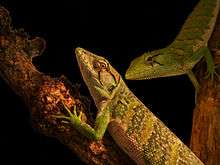Polychrus marmoratus
Polychrus marmoratus or many-colored bush anole[1] is a species of bush anole. It is also commonly referred to as the monkey lizard due to its slow movement.[2] The lizard has many predators, including spiders and primates.[3]
| Polychrus marmoratus | |
|---|---|
_(10348875545).jpg) | |
| Polychrus marmoratus in Guyana | |
 | |
| Scientific classification | |
| Kingdom: | Animalia |
| Phylum: | Chordata |
| Class: | Reptilia |
| Order: | Squamata |
| Suborder: | Iguania |
| Family: | Polychrotidae |
| Genus: | Polychrus |
| Species: | P. marmoratus |
| Binomial name | |
| Polychrus marmoratus Linnaeus, 1758 | |
Description
Polychrus marmoratus weighs 101.19 grams.[4] The lizard is 30 to 50 centimeters long. It has a blunt snout with large and smooth scales on the dorsal surface of the head.[5] The scales on the flank and skin are smaller. The lizard is commonly brown or olive-grey. Blue or black spots may be present on the head. The neck is bluish, while the ventral region is whitish. Five or six "V-shaped bands" are present on the back.
The lizard hunts insects using an ambush method.[6] The lizard inhabits semi-deciduous forests.
Distribution
The species is present in Guyana, Brazil, Peru, and Ecuador.[7] The species has also been sighted in Trinidad and Tobago, Venezuela, and Florida.
References
- "ITIS Standard Report Page: Polychrus marmoratus". Interagency Taxonomic Information System (ITIS). Retrieved 2019-04-20.
- "Polychrus marmoratus". The Reptile Database. Retrieved 2019-04-20.
- Koski DA, Koski AP (2017). "Polychrus marmoratus (Common Monkey Lizard): Predation". Herpetological Review. 48 (1): 200.
- "Polychrus marmoratus (Linnaeus 1758)". Encyclopedia of Life. Retrieved 2019-04-20.
- Avila-Pires TC (1995). "Lizards of brazilian amazonia (Reptilia: Squamata)". Zoologische Verhandelingen. 299 (1): 1–706.
- Hosein I (2015). "Polychrus marmoratus (Multi-coloured Tree Lizard)" (PDF). uwi.edu.
- Torres-Carvajal O, Koch C, Venegas PJ, Poe S (2017-06-01). "Phylogeny and diversity of neotropical monkey lizards (Iguanidae: Polychrus Cuvier, 1817)". PLOS ONE. 12 (6): e0178139. Bibcode:2017PLoSO..1278139T. doi:10.1371/journal.pone.0178139. PMC 5453479. PMID 28570575.